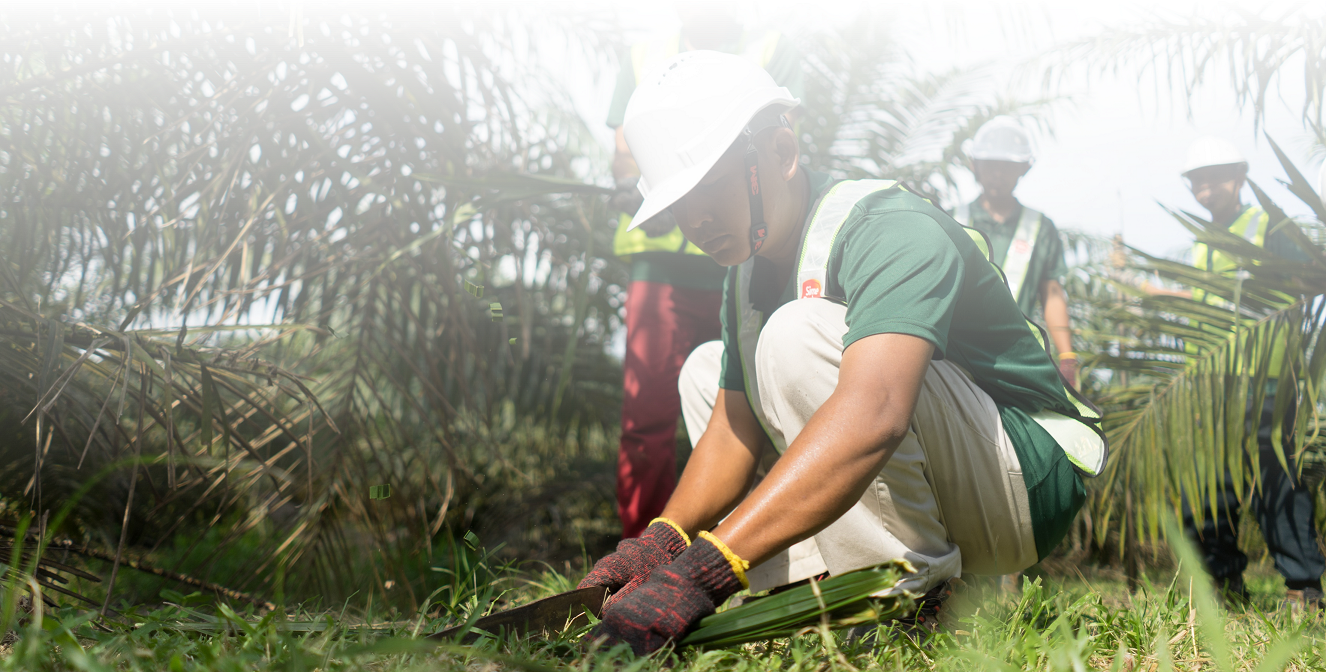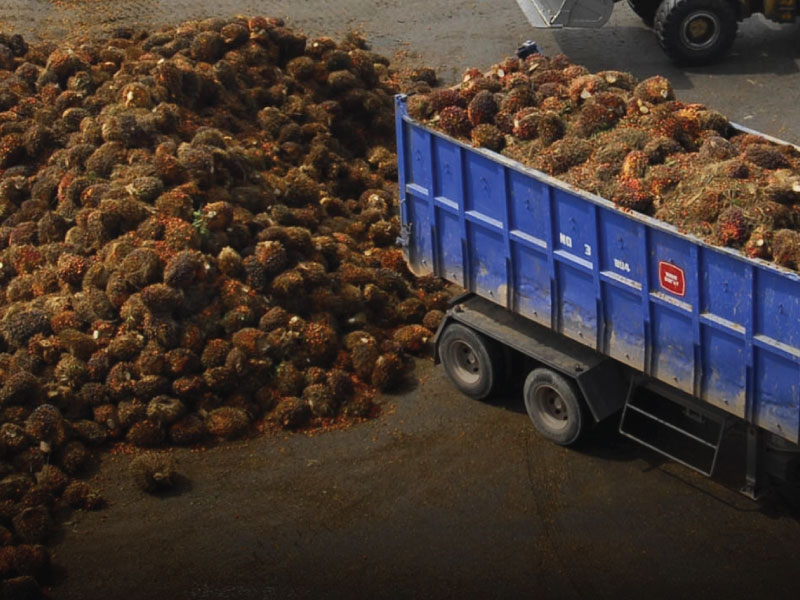Sustainability Management
[GRI 2-9, 2-12, 2-13, 2-16, 2-23, 2-24, 3-3, 405-1]
SDP’s Board of Directors is accountable for the Group’s sustainability commitments and performance. Our Board comprises 11 members, six of whom are independent directors, including one independent non-executive director appointed in May 2021. Nine members are Malaysian, one is Singaporean, and another is a British national. Three Board members are women. Our Board’s composition reflects the diverse professional and educational backgrounds. For more information on our Board composition, see the SDP Annual Report 2021, page 86.

Diagram of overall Sustainability Governance in SDP
The Board’s Role
The Board takes an active role in looking into climate change, conservation and biodiversity, human rights, supply chain amongst other sustainability related matters of the Group through the Board Sustainability Committee (BSC). The BSC supports the Board’s oversight of the Group’s sustainability objectives, policies, and practices. The BSC is Chaired by Dato' Henry Sackville Barlow, Independent Non-Executive Director and has four other members. This includes strategies on environmental, social and governance fronts, as well as climate-related strategies and grievances raised against SDP.
At every quarterly BSC meeting, the progress of the Group’s efforts to decarbonise its operations are monitored and deliberated as a standing agenda item. This includes monitoring and reviewing the progress of renewables projects (biogas & solar initiatives), efforts in implementing nature-based solutions and reforestation projects, and also efforts to eliminate deforestation within the Group’s supply chain against SDP’s overall climate strategy. On top of that, other climate change-related matters are also deliberated at the various BSC meetings throughout the year. These include reviews on the study by the R&D team on the impacts of physical climate risks to the organisation, and enhancements of climate related disclosures (e.g., improvements in line with TCFD recommendations).
Social and Governance aspects of the Group are also deliberated and discussed during the BSC meetings. Recently, the meetings have focused heavily on workers welfare and well-being as outcomes of the human rights workstreams including the implementation of improved policies and procedures, matters discussed at the social dialogues and issues raised through the grievance channels. The BSC analyses the issues raised through the grievance channels and deliberates the outcomes of high-risk cases to ensure remediation is transparent, swift, and fairly implemented. The BSC further monitors the assessment against the ILO Forced Labour indicators through the interim governance structure further outlined below.
Our independent sustainability advisor, Dr Simon Lord, provides timely advice on specific sustainability initiatives and topics. During his tenure and attendance at all BSC meetings, he has developed reports to the BSC around Transitioning to a Net Zero Commitment, Regenerative Agriculture and Nature Based Solutions, and Future Trends in Sustainability. Dr Simon Lord is also involved in the respective human rights workstreams. External subject matter experts around climate change have also been invited to present the latest transition trends around climate change post COP 26 in November 2021. For more information on the roles and responsibilities, and key areas covered by the BSC in the last financial year, go to page 101 of the Annual Report.
Key outcomes of the BSC meetings are escalated to the quarterly Main Board meetings. This includes the progress made by the Group around the various decarbonisation efforts underway. It also highlights any key challenges or issues. Major climate change related decisions, such as major investments for renewables, and SDP’s options for more ambitious climate change targets are also deliberated at the Main Board.
The Board periodically attends training on sustainability and key environmental, social and governance developments. In 2020, the Board attended 14 ESG related training events and 44 training events in 2021. This includes amongst others, training events related to Climate Action and Climate Governance as well as Forced Labour impacts and the Circular Economy. More details on the BSC activities are available in the Sustainability Committee Report of the SDP Annual Report 2021.
Aside from the BSC, sustainability risks are monitored in our Enterprise Risk Management (ERM) framework that is governed by the Risk Committee. The ERM includes amongst other issues, environment, social and governance risks that are material to the Group. More details of the Group’s ERM and activities of the Risk Committee are available in the Risk Committee Report of the SDP Annual Report 2021.
Management’s Role
The Group Managing Director (GMD) is accountable for sustainability related matters for the entire Group, including climate change. This is then cascaded down to the respective members of the Plantation Leadership Committee (PLC). The PLC is chaired by the GMD. Environmental, Social, and Governance (ESG) related metrics are included as part of the GMD’s corporate scorecard where one of the Key Performance Indicators measure the performance of the Group against an external sustainability benchmark. This benchmark assessment includes climate change related metrics around the Group’s climate change commitments and progress in decarbonisation within the operations and throughout the supply chain. The assessment also addresses key Social and Governance metrics such as human rights and labour rights.
Sustainability related matters are also a standing agenda of the monthly PLC meetings. Progress of the Group’s climate action, including decarbonisation efforts are reported during these PLC meetings. Key climate change related developments and risk are also highlighted and deliberated during the monthly PLC meetings where required. The topics deliberated include future regulatory requirements such as the EU Due Diligence on Deforestation, customer NDPE requirements and expectations and other material climate change related risks and opportunities. The progress of other ESG matters is also deliberated during the PLC meetings. These include the monitoring and reviewing the progress of the Group’s Human Rights programme, Occupational Safety and Health Performance, Responsible Sourcing programme developments, and the status of the Group’s certification programme and compliance to its various Charters, Policies and Procedures.
SDP’s sustainability team is led by the Head of Group Sustainability, who reviews SDP’s sustainability strategies, commitments, and plans, and oversees their implementation. He is responsible for reporting on updates, progress, and critical concerns to the BSC every quarter and reports directly to the GMD. The sustainability team at our head office is staffed by over 30 employees and oversees more than 50 operational teams across all business units. Possessing local, international, and technical expertise, the team also manages the day-to-day implementation of our No Deforestation, No Peat and No Exploitation (NDPE) commitments and related policies. Its activities include continuously engaging with relevant stakeholders on their respective roles.
In 2021, SDP was accepted as one of the 56 Members of the CEO Action Network or CAN which is a closed-door peer-to-peer informal network of CEOs and Board members focused on sustainability advocacy, capacity building, action and performance. Through a dedicated Working Group, Workstreams and active members driving bespoke initiatives, CAN aspires to catalyse its members towards shaping future-ready and ESG-integrated business models and ecosystems. As a member of this coalition, SDP will have a voice in a partnership aiming to achieve the Group’s collective ESG commitments.
Re-Evaluated Governance Structure on Human Rights
Board Sustainability Committee (BSC)
Meets every fortnight to provide overall direction. Comprises five senior directors.
Steering Committee (SC)
Meets on weekly basis
Chairperson: Group Managing Director
Members: Chief Financial Officer, Managing Director SDO, Chief Human Resources Officer, and SDP Sustainability Advisor
Working Group
Meets twice a week
Chairperson: Chief Financial Officer
Project Manager: Chief Risk Officer
Members: PLC Members and Functional Heads
In July 2021, the BSC adopted a special Terms of Reference to monitor the ongoing assessment and continuous improvement plan to address the resolution of labour issues. The BSC is supported by a two-tier management team in undertaking the assessment and continuous improvement plan. The first of these is the Steering Committee (SC) chaired by the GMD, which meets weekly and the second is a Working Group (WG) chaired by the Chief Financial Officer, which meets at least twice a week and comprises seven separate workstreams that are led by members of the PLC or functional heads. By demonstrating the commitment of SDP’s senior management and its direct involvement in the initiatives being deployed, thus putting heavier emphasis on sustainability within formal performance management targets, we have already effected transformative behavioural change.
In addition, key structural changes have been made to ensure a dedicated focus on worker welfare as well as to ensure continued compliance with ILO and sustainability standards. As of January 2022, we have appointed 40 fulltime dedicated Site Safety and Sustainability Officers (SSSO), to assist and support our Strategic Operating Units (SOUs) with managing safety and sustainability activities and initiatives on the ground, with a particular focus on human rights matters. The new officers are tasked with managing overall documentation, providing on-site support for operations compliance monitoring, and setting out actionable immediate next steps in managing any safety and sustainability concerns or issues should it arise.
The new Head of Social Welfare & Services will report to the Chief of Upstream Business Support, an experienced individual who has been appointed to this role, effective 1st April 2022 to sustain the transformational changes that have been instituted in Upstream Malaysia.
This team will be responsible for overseeing the implementation of policies and procedures related to the well-being and safety of workers, ensuring that day-to-day upstream operations comply with internationally recognised best practices.
Diagram: New structure of Upstream Malaysia focussing on workers’ welfare
Additionally, to emphasise a zero-tolerance approach, we have taken stern and swift action against those who did not adhered to the company’s policies. This is particularly important as consequence management and accountability will ensure a shift in culture.
New ESG Scorecard
A new ESG Scorecard outlining KPIs that reflect the initiatives we have undertaken to meet the requirements of the ILO and to fully address the Forced Labour Indicators (FLI), was developed as key outcomes from the workstream. Communicated to all estates and mills in January 2022, this scorecard supplements the Main Financial & Operational Scorecard (Main Scorecard) and supersedes a previous system which incorporated a Sustainability Health Index (SHI). This standalone ESG scorecard is effective for the 2022 financial year and progress will be measured on a quarterly basis.
Previously, the SHI was a KPI in the Main Scorecard with a 5% weightage and success was mutually decided by both employee and manager. We have now not only increased weightage significantly and eliminated any potential risks of discretionary evaluations, the new ESG Scorecard also puts greater emphasis on ESG performance, particularly on specific labour-related practices. Crucially, the new system is independently monitored for objectivity.
The ESG Scorecard aims to drive behavioural change. It has been constructed with three behaviour-based indicators and two outcome-based indicators. These are demonstrated in the table below:
| KPI | Measurement Criteria | Type |
|---|---|---|
| Closure of Grievances | Closure of 95% grievances raised that are within purview of the operating unit | Behaviour-based |
| Operational Health & Safety | Quality of intervention and approach towards improving processes and governance | Behaviour-based |
| Social Dialogue | Conduct of social dialogues based on success factors | Behaviour-based |
| Workers Satisfaction Survey | Score of quarterly surveys sent to workers to measure effectiveness of initiatives | Outcome-based |
| Environmental & Governance Compliance | Compliance to legal and statutory requirements and conformance to sustainability certifications | Outcome-based |
The scorecards are assigned to the respective individual management teams at estates and mills and accountability to drive collective performance is escalated upwards to the regional level. At country level, the CEO of Upstream Malaysia is responsible for the overall performance of all regions in Malaysia. Details are as outlined in the diagram on the next page. Consequence management will be undertaken for individuals who do not comply with the indicators. The performance of the new scorecard will be evaluated in the financial year 2022.
Driving ESG agenda at different levels
Ethics and integrity
[GRI 3-3, 205-2]SDP is committed to conducting business professionally, with integrity and in compliance with the national laws of the countries in which we operate. SDP has a zero-tolerance policy on all forms of corruption. Our business activities are guided by SDP’s Code of Business Conduct (COBC), a handbook that spells out the standards of behaviour expected of SDP Group directors and employees, and where applicable, vendors and business partners. It also outlines our anti-corruption and no-gift policies.
In 2020, the internal COBC and vendor COBC were revised and updated as part of our Anti-Corruption Compliance Programme. In 2020 and 2021, over 13,600 executive and non-executive employees received relevant training on the COBC across our upstream and downstream operations globally. Refresher trainings will be conducted every two years. Vendors are also included in the trainings under the Vendor COBC outreach.
SDP’s Whistleblowing Policy provides guidance to stakeholders reporting violations against procedures and raising concerns on any wrongdoings they may observe in the Group without fear of retaliation. Grievance channels are also available on the ground for workers to raise concerns.
Alignment with the MCCG
In 2021, we revised the Board Sustainability Committee’s Terms of Reference to reflect the updated Malaysian Code on Corporate Governance (MCCG). The MCCG was updated to better align with globally-recognised best practices and standards and included requirements for strengthened board oversight and the integration of ESG considerations.




